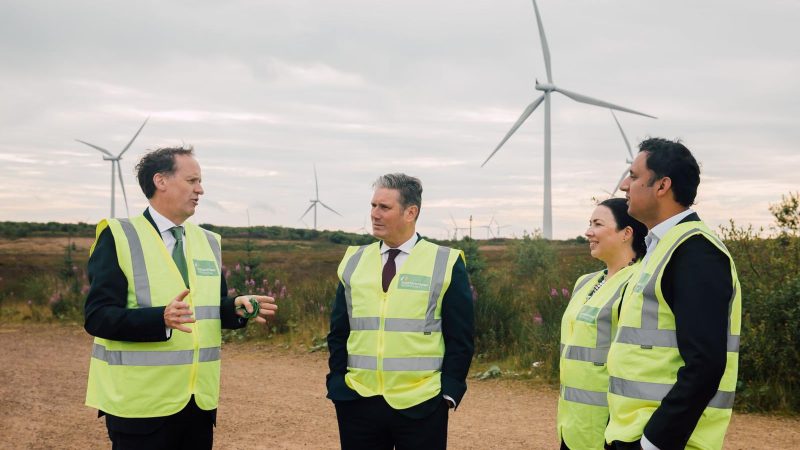
Where the rest of Labour’s platform has been resolutely cautious and incremental, saving most of our fiscal and political firepower for the short campaign, there is one policy that stood out – the green prosperity fund.
Labour not only signed up for a massive spending commitment, but it also put a clear and inarguable price tag on the policy. This policy, almost uniquely in Labour’s policy offering, was defined by how much the policy would cost, rather than what it is supposed to achieve.
This was a disaster waiting to happen as we head towards an election. Labour is right to drop it.
The £28bn pledge was a potential liability
The problem with the green investment pledge is not exactly the concept. The UK needs to transition rapidly away from fossil fuel use, and our investment spending as a proportion of GDP has been very bad for a long time. Government needs to generate investment for each of these goals.
The problem is that the pledge had the potential to be a political and policy liability. The first issue with the design of the policy had already been discussed and remedied. As originally constituted, the policy didn’t allow for any build up in the amount spent. The policy, therefore, would have entailed wasteful spending at the start of a parliament when proper projects had yet to be identified. Reeves has already dealt with this, but not without endless complaint in the media and the party.
The second – bigger – problem is that the policy was a hostage to fortune. It didn’t have any contingency built into it. Most obviously, a policy based on borrowing to fund growth must consider the return on investment of projects and the interest rate.
Perhaps no-one expected this issue when the policy was announced (before Liz Truss, Vladimir Putin and the global recovery from Covid caused interest rates to fly through the roof), but now we know that this is a very real liability. Projects that are cost effective when real interest rates are at zero simply do not make economic sense if they rise to be 4 or 5%.
The policy didn’t even account for inflation, meaning that, as prices fluctuate, the real-terms cost of the pledge may increase or decrease. That is a political hostage to fortune that we can do without.
The pledge could easily have been exploited by the Tories
Secondly, it is a hostage to the Tories. If Jeremy Hunt and his Treasury team knew what they were doing, they would adjust the fiscal envelope to make this pledge as tricky as possible to fulfil whilst remaining inside Rachel Reeves’s rules.
Since the £28bn included any investment that the Tories had already pledged (so-called ‘baselining’), Hunt may well have chosen to strip back green investment from his own plans, to create a bigger shortfall for us.
Furthermore, Hunt could simply continue to spend (or offer in tax cuts) any headroom that comes his way, so there simply isn’t any space for Labour to borrow without public debt increasing over the course of the next parliament.
It is straightforward for a sitting Chancellor to engineer a kind of ‘trilemma’ in which Labour must choose between, say, funding the NHS, borrowing the £28bn and raising taxes. Regardless of which side of the impossible triangle Labour picked, this would be damaging for us going into an election. Consequently, we must deprive Hunt of this ability.
Labour must shift focus from the cost of the policy to its benefits
Finally, it artificially created a political tension between one goal – decarbonising the economy – and all our other goals. There isn’t a sharp trade-off between policies that take us towards net zero and those that aim for other desirable Labour things such as a thriving and effective NHS, rapid economic growth or good jobs.
However, if we have decided that almost all available capital spending should be allocated to green projects, we may end up forcing unnecessary capital austerity on public services. Since the state of the NHS and the school estate also matter to us and the public, such a redirection of resources would be far from sensible.
It is right to step away from the £28bn price tag, shifting the focus away from the cost of the policy and towards the benefits. Dropping a policy is always difficult, but if we’re going to do it, now is the best time.
We should retire the totemic number and focus our green and growth missions on outcomes, not inputs. The public don’t care about inputs, and we can’t guarantee them whilst in opposition anyway.




More from LabourList
Turning the page? Labour’s recovery in the polls show a path to 2029 victory
Restoration announce recommendations for NEC candidates
‘Factionalism at the top is weakening Labour – and handing a gift to Reform’